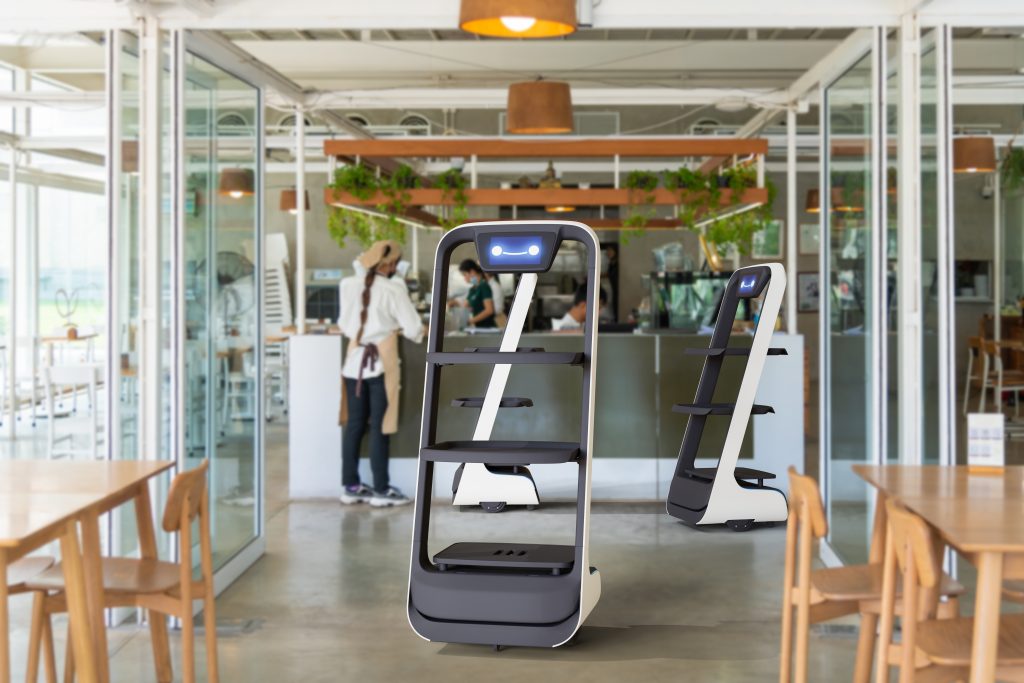Service robot trials are increasing across the UK hospitality sector. Are robots an effective short-term fix for staff shortages or could they be here to stay? David Crump, Corporate Finance Director at PKF Smith Cooper, explores the causes and challenges behind robots in hospitality in our latest ‘5 minutes with Corporate Finance’ article.

Have you ever had a robot serve you dinner? This unique experience awaits holidaymakers visiting Bella Italia at Whinfell Forest Centre Parcs. The Big Table Group – owner of Bella Italia, Las Iguanas and Café Rouge – is one of several organisations within the UK hospitality industry currently trialling service robots.
Manufactured by Chinese company Pudu, the ‘BellaBot’ can carry up to 40kg of weight and has been programmed to engage in simple interactions with guests. The robot has the ability to deliver and collect trays from tables (with a little loading and unloading help from humans) and can even sing happy birthday!
As of June 2022, there were 60 Pudu robots working in 20 businesses across the UK. Although most of these robots are stationed in restaurants, you could also encounter one in a hotel, supermarket, care home, bowling alley and snooker club.
From greeting you front of house and cleaning your hotel room to mixing your cocktails on a cruise ship, service robots are growing in number and capability.
What has caused the increase of robots in hospitality?
Given how heavily reliant present-day society is on technology, it was always going to be a case of ‘when’ rather than ‘if’ robots would be introduced to the hospitality sector. However, several factors have contributed to the sharp incline in service robot numbers that has occurred over the past couple of years.
Staff shortages
The main reason for the increase in robots is record-high staff shortages – 10% of hospitality jobs in the UK are currently vacant and vacancies are costing the industry approximately £21 billion in lost revenue.
Many of these hospitality roles were previously occupied by European workers, who have since returned to their home countries following Brexit, leaving a string of vacancies in their wake. The sector also continues to lose staff to other industries, with hospitality workers changing careers in pursuit of more sociable working hours and higher wages.
Service robots offer struggling hospitality businesses a ready-to-go alternative to human employees, without the need for training or risk of job dissatisfaction.
COVID-19 pandemic
National lockdowns and social distancing, along with other government-enforced restrictions during the COVID-19 pandemic, created a sudden and urgent need for customer service that limited human contact.
Robots proved to be an effective solution for socially distanced workplaces, providing a stopgap for employee absences and reducing service disruption.
Publicity
Service robots may be on the rise, but they are still a relatively new and exciting phenomenon in the UK. Customers are therefore inclined to share their encounters with service robots via photo and video on social media or through word of mouth.
Investing in a service robot can generate significant publicity for a hospitality company, which can attract new customers and boost business.
Advantages and disadvantages of service robots
The use of robots in hospitality is an ongoing debate, both inside and outside the sector. There are benefits and challenges that come with service robots.
| Potential advantages | Potential disadvantages |
| A solution for staff shortages | Possible negative effect on working culture for staff |
| Can increase business efficiency when implemented correctly | Skills gap – service robots are not able to replace skilled workers, such as chefs |
| Boost productivity within an organisation | High maintenance costs |
| Can carry out tedious but time-consuming tasks, giving staff more capacity for more engaging work | Impact on customer experience – some people may prefer the human touch |
The verdict – balance is key
Despite what decades of sci-fi films may have taught us, robots in the hospitality sector do not have to result in an ‘us versus them’ showdown. Implemented well, they have the potential to boost productivity and output for businesses by supporting employees. Robots can remove the burden of mundane tasks from staff and create capacity for more challenging and rewarding work to take place.
The primary challenge that the hospitality sector will face in the future is finding a balance between man and machine, which meets the needs of businesses, employees and customers.
If you are a business operating in the hospitality sector in need of more specialist advice and guidance, get in touch with us today to arrange an initial consultation with one of our Corporate Finance experts.
Subscribe to our insights to receive future articles directly to your inbox.




